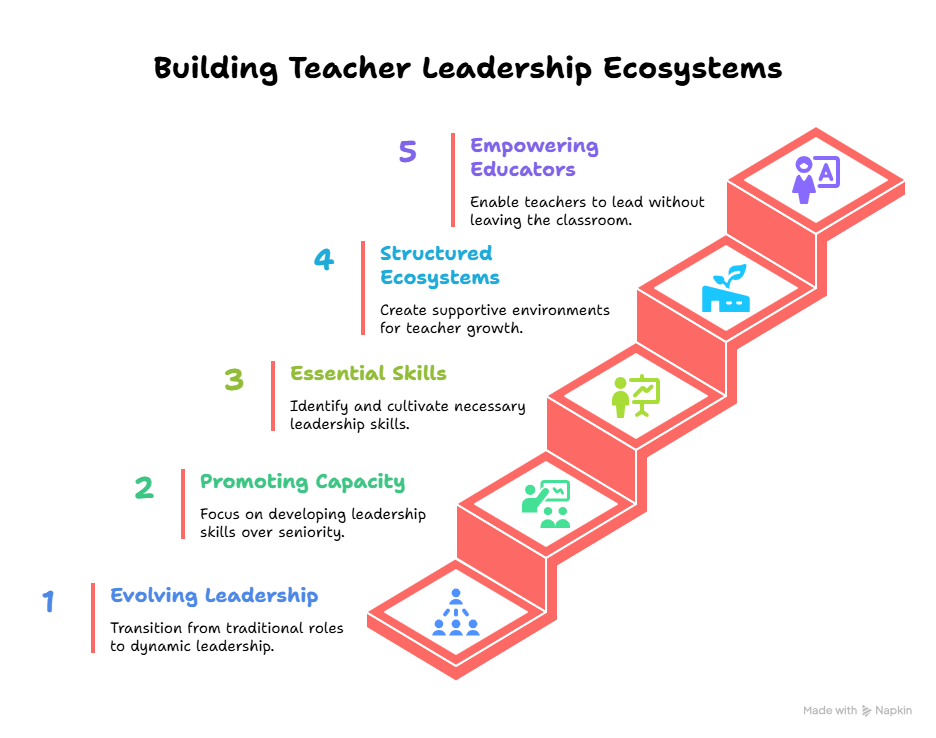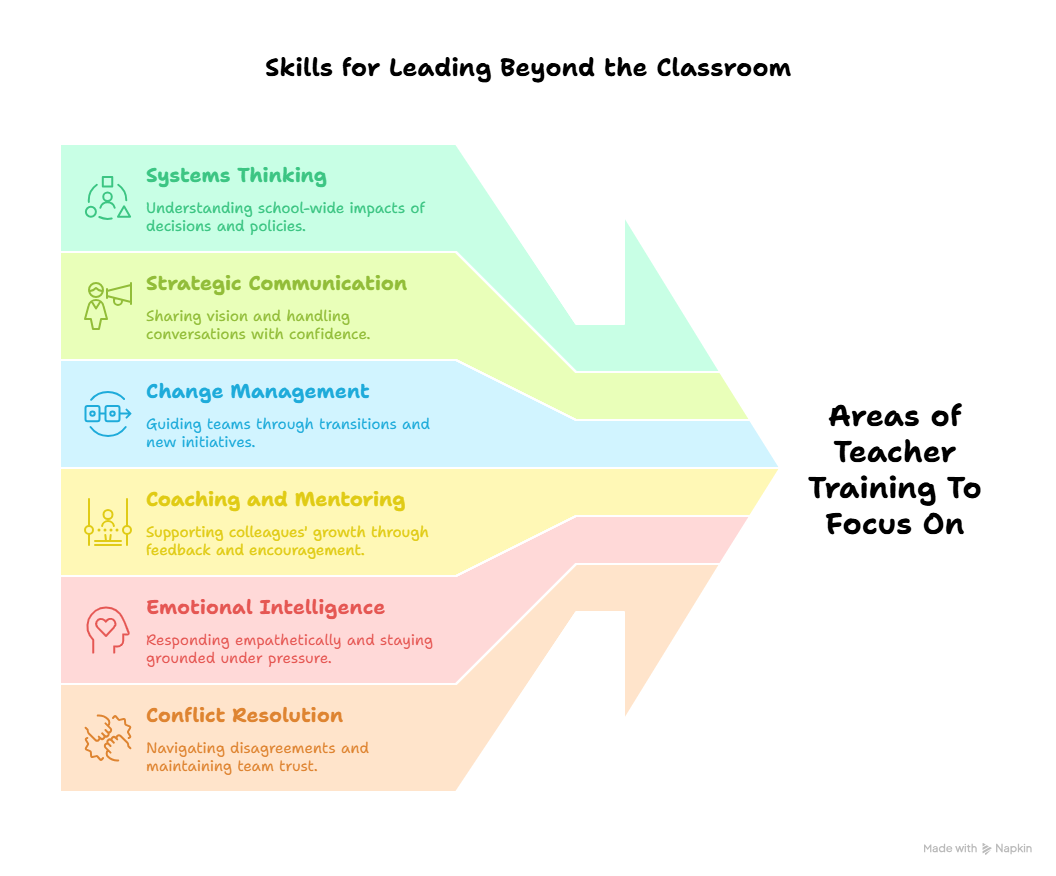Discover how teacher training programs can transform school leadership, build mentorship pipelines, and create a culture of growth. Learn actionable strategies to empower educators beyond the classroom.

Leadership Isn't a Title - It's a Mindset!
Leadership in education is no longer just about principals or administrators. It begins right in the classroom with teachers who inspire, collaborate, and lead without waiting for a formal designation.
These teacher-leaders are reshaping how schools operate: they mentor peers, foster student agency, and drive curriculum innovation. But for many schools, the systems haven’t caught up to this new reality.
This raises a few key questions that school communities urgently need to ask:
Questions Schools Must Start Asking
- Why is teacher training and school leadership key to transforming education?
- What does the research say about teacher training, teacher leadership and student achievement?
- How do teachers feel nurtured and supported in their current networks?
- Are Indian schools providing space to build community, encourage inclusivity, and create a culture of continuous improvement for teachers as well as students?
- Why are traditional leadership pipelines failing, and how can we redesign them?
The Evolution of Teacher Leadership Through Teacher Training
Historically, teacher leadership referred to formal titles such as department head, advisory board member, union rep. But from the 1980s onwards, educational reform began reimagining what leadership could look like.
According to the Educational Research Review:
“Teacher leadership became less about sharing managerial responsibilities and more about sharing responsibility for making change… These opened up opportunities for teachers to help redesign schools, mentor colleagues, engage in problem solving at the school level, and provide professional growth activities.” – Educational Research Review, Volume 31, November 2020
This shift emphasized collaborative, system-level influence, not just task-based authority.
Teacher training isn’t just about mastering subject knowledge or classroom management it’s the foundation for sustainable school leadership. High-quality professional development equips educators with critical skills like strategic planning, coaching, and change management. When teachers have access to continuous learning and clear growth pathways, they feel more confident stepping into leadership roles. This not only improves teacher retention and satisfaction but also strengthens the entire school culture, making it more resilient and adaptive to change.
What the Research Says About Teacher Leadership & Student Achievement
Reading Rockets defines teacher leadership as:
“The process by which teachers, individually or collectively, influence their colleagues, principals, and other members of the school communities to improve teaching and learning practices with the aim of increased student learning and achievement.”
This influence goes beyond curriculum it includes building culture, mentoring peers, and improving outcomes across the system.
Leadership, then, isn’t simply an individual skill, it’s a networked responsibility that touches every corner of the school; enabled through teacher training.
What Happens When Schools Don't Invest in Leadership Through Teacher Training?
Failing to recognize the role of leaders in quality and equitable schooling is unfortunate and must be redressed. Leadership is fundamentally about organized agency and collective vision, not managerialism, since it is an organizational quality, not merely a positionality attribute. Most importantly, if change is to be systemic and transformative, it cannot occur uniquely at the individual teachers’ level. School organization is fundamental to circulating and consolidating new innovative actions, cognitive schemes, and behaviors in coherent collective practices.
When leadership is seen as purely managerial, or only at the top, schools risk:
- Burnout among their best teachers
- Disconnected professional development programs
- Stalled innovation
- High turnover and disengagement
“Leadership is fundamentally about organized agency and collective vision—not managerialism. School organization is fundamental to circulating and consolidating new innovative actions, cognitive schemes, and behaviours in coherent collective practices.”
Put simply: transformational change requires systemic leadership, not just strong individuals.

The Skills That Actually Matter Beyond the Classroom
To truly lead in education, we need teachers who are equipped with 21st-century leadership skills , many of which are not traditionally taught or supported:
- Systems Thinking: Seeing the bigger picture across classrooms and roles
- Change Management: Leading transitions, not just surviving them
- Coaching and Mentoring: Supporting peers, not just managing tasks (Read our blog on mentorship: Learn More About Mentorship)
- Emotional Intelligence: Navigating classroom dynamics and adult relationships
- Strategic Planning & Communication: Vision-setting and execution at scale
Many of these are embedded in modern leadership development programs, but are still out of reach for most school teams without systemic investment.
And are we training teachers in these skills?
Instead of preparing them to lead, many schools just promote based on availability, seniority, or emergency need, not readiness or intentional growth.
How Can Schools Support Teacher Leadership & Teacher Training?
This is the big one: support requires structure.
Ad-hoc delegation doesn’t create leaders. Neither do one-off workshops with no follow-through. Schools need ecosystems that nurture leadership over time.
That means:
- Intentional leadership development tracks
- Internal mentoring models
- Peer coaching frameworks
- Role clarity and feedback systems
- Long-term partnerships with PD organizations
Empowered teachers don’t need to leave the classroom to grow, they need space to lead from the classroom.
Want to Grow Leaders Within Your School?
That’s where the School Partnerships Program at Ekya PDI comes in.
We work with schools to build:
- Leadership development pipelines
- Professional learning communities
- Mentorship ecosystems
- Custom Professional Development plans that scale with your school’s growth
- Other teacher training programs with workshops and self-paced courses
Whether you’re developing HODs, internal mentors, or instructional leaders, we co-create systems that make leadership visible, sustainable, and actionable.
Your next generation of school leaders are already in your classrooms. Let’s give them the tools, training and the ecosystem to lead.
